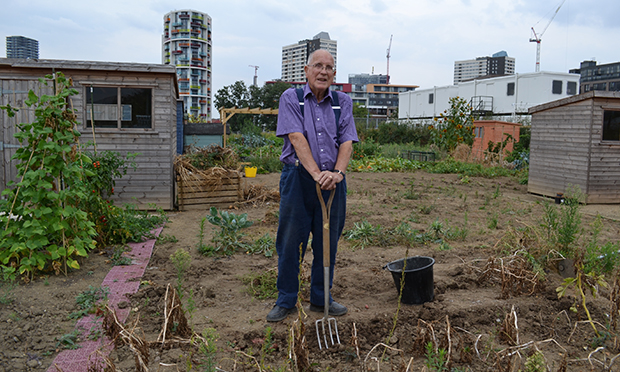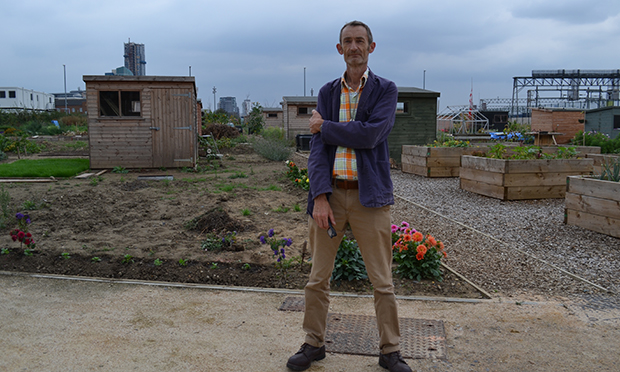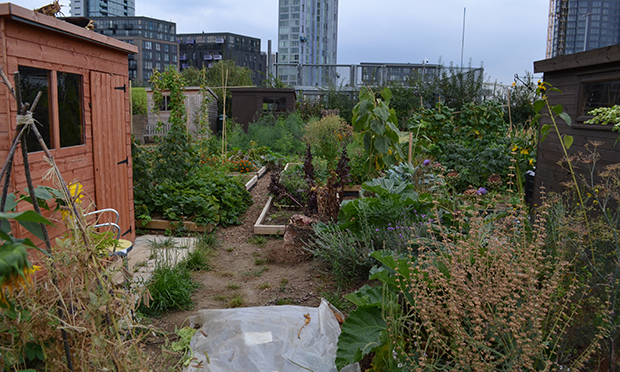Allotment tenants evicted from Olympic Park reap harvest in new plots

Hackney resident John Day, one of the original Bully Fen plot holders
Allotment holders evicted from the Olympic Park almost a decade ago harvested their first vegetables this autumn at new plots leased to them by London 2012 legacy chiefs.
The Manor Gardening Society was forced to leave its beloved Bully Fen base in 2007.
Those allotments, which were located in Hackney, had been gifted to East Londoners “in perpetuity” by Old Etonian banker and philanthropist Major Arthur Villiers one hundred years ago but were swept away to clear space for the sporting extravaganza.
The eviction caused uproar, and the London Legacy Development Corporation (LLDC) then exacerbated this indignation by reneging on its promises to deliver replacement allotments in the Olympic Park by December 2014.
This whole sorry saga is among the stories documented by Manchester academic Gillian Evans in her riveting book London’s Olympic Legacy: The Inside Track.
Suffice to say, it was not until earlier this year that Manor Gardening Society finally signed a 38-year lease with the LLDC and got the keys to its new plots at Pudding Mill.
Among those who were last month harvesting carrots, tomatoes, beans and peas was John Day, 87, a Hackney resident who is the oldest Manor Gardening Society member and was one of the original Bully Fen plotholders.
Mark Harton, the society’s secretary, said the last eight years had been “so stressful”, but he added: “This is what we’ve got now, and we’ve got to accept it and move on.”
Working their new patch of land, which currently contains 50 lots and covers an area of around one hectare, has helped heal plotholders’ anger about the eviction, he added.
“It just took a couple of weeks for us to almost forget what we’d been through,” he said. “To an extent we have to put that behind us anyway, or we’re not going to achieve anything.
“Already this feels and looks like a traditional UK allotment site. It’s growing as it should be. It’s marvellous what everyone’s achieving.”
He added: “If you think this has only been here for a couple of months, you’d have to be a very hard-nosed politician to walk through here and not see there’s really a demand for land like this.”

Moving on: Secretary of the Manor Gardening Society Mark Harton says the new allotments have helped heal plotholders’ anger
Allotments grew in popularity after the Enclosure Acts as a means of giving the ‘labouring poor’, particularly those living in cities, a chance to grow their own food and allow them to have greater control over their lives.
Harton said: “There’s a broad range of people on this site, and in the years I’ve been involved in these allotments, the thing I’ve recognised is that aspect of individual responsibility, and, in keeping with the tradition of allotments in the UK, tenancy.
“Each individual has responsibility for that patch of land, and for many people who may live chaotic lives or may live in unusual circumstances, that may be one of the few things in their life where they have consistent responsibility.
“That allows people to grow, as much as their crops that they’re growing every year.”
The new allotments are not without their issues, however. There are fears buildings set to be erected adjacent to the site may block sunlight and make growing food impossible on some plots.
And Mike Wells, who chronicled Olympics scandals such as the displacement of the allotment holders via his website Games Monitor, said it would be hard to replicate the atmosphere of Bully Fen.
“You can’t really recreate that because it was intangible – its history, its location, were kind of everything. You take that away and it is irreplaceable,” he said.
But for the Manor Gardening Society, which has a sister site in Marsh Lane, Waltham Forest, the Pudding Mill site is all about re-instating the Villiers legacy in East London. Time will tell whether their dream will be fulfilled.

Green shoots: the new allotment site at Pudding Mill
